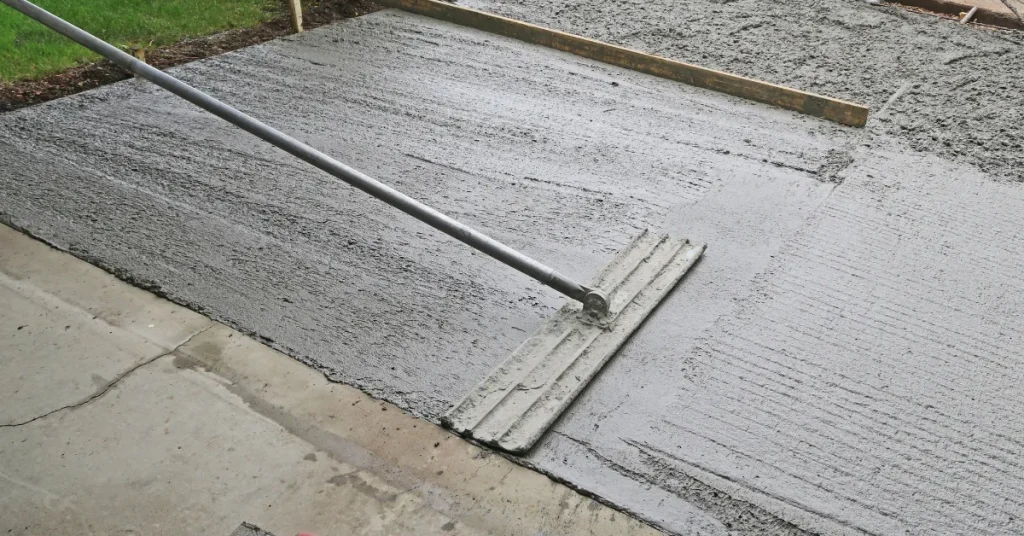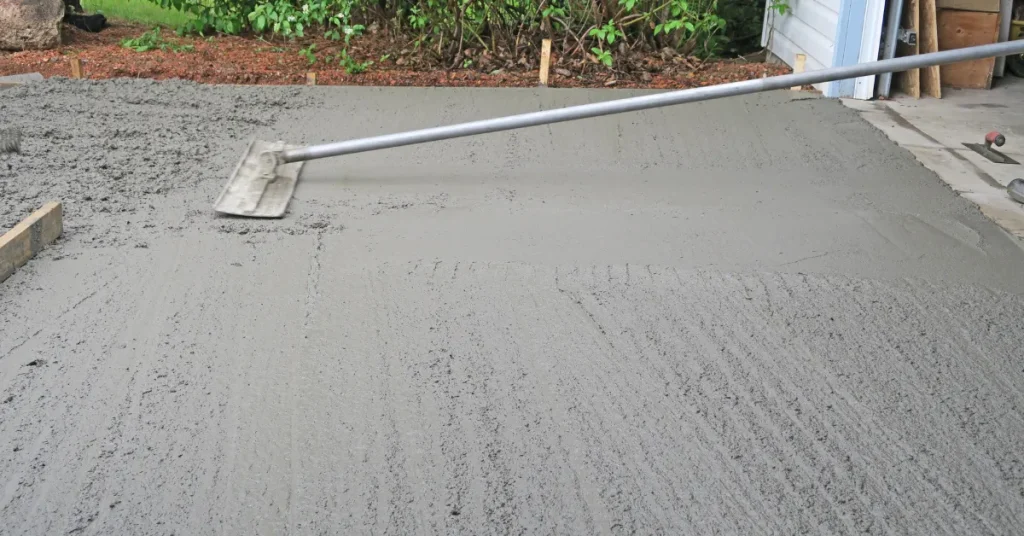A standard concrete driveway is typically 4 inches (100mm) thick. For heavier vehicles, a thickness of 5-6 inches (125-150mm) is recommended.
Constructing a reliable and durable concrete driveway demands careful consideration of thickness to ensure longevity and performance.
Homeowners and contractors should base their decision on the type of traffic expected on the driveway. The 4-inch thickness suits most residential driveways where foot traffic and cars are common.
The increased thickness up to 6 inches caters to occasional heavy vehicles, providing the necessary support and reducing the risk of cracks. Selecting the proper thickness is a crucial step in driveway installation.
It not only contributes to the driveway’s structural integrity but also to its resistance to wear and tear over the years. Proper installation and thickness directly affect the driveway’s maintenance costs, making it a significant aspect for homeowners to consider.

The Importance Of Proper Concrete Thickness
Choosing the right thickness for your concrete driveway is crucial. It ensures durability, strength, and a long-lasting surface for daily use. A poorly constructed driveway can lead to cracks, potholes, and early degradation.
That’s why understanding concrete thickness is non-negotiable for any homeowner or contractor.
Factors Influencing Concrete Durability
- Climate: Extreme weather can cause expansion and contraction in concrete.
- Soil type: Some soils shift more than others, affecting the concrete above.
- Load: The weight of vehicles that will use the driveway determines concrete strength needed.
Evaluating these factors will guide the decision on how thick the driveway concrete should be. Each aspect contributes to the overall performance of the concrete surface over time.
Role Of Thickness In Longevity
The thickness of the concrete plays a pivotal role in its longevity. Thick concrete withstands more, from environmental stressors to heavy loads.
It’s not just about supporting cars; it’s about creating a stable and resilient surface that resists cracking and other forms of damage. Proper thickness is the foundation of a durable driveway.
| Vehicle Type | Recommended Thickness |
| Passenger Cars | 4 inches |
| Trucks/SUVs | 5 inches |
| RVs/Heavy Duty | 6 inches or more |
Standard residential driveways typically employ a four-inch thickness. For heavier vehicles, a five to six-inch thickness may be necessary for extra support.
In conclusion, taking shortcuts on concrete thickness is never wise. Quality construction with the right thickness ensures a driveway that stands the test of time.
Standard Thickness For Residential Driveways
When planning a concrete driveway, a crucial factor to consider is thickness.
The standard driveway thickness supports everyday vehicle traffic and ensures longevity.
Thicker concrete handles more weight and lasts longer.
Let’s explore common measurements and situations where increased thickness might be necessary.
Common Measurements
For most residential driveways, a four-inch concrete slab is standard.
It’s strong enough for cars and small trucks. The following points detail common measurements:
- Four inches – ideal for passenger vehicles
- Six inches – supports heavier vehicles and equipment
Use a guideline more than a fixed rule. Consider the following variables:
| Vehicle Type | Recommended Thickness |
| Passenger Vehicles | Four Inches |
| Larger Vehicles, RVs | Six Inches |
When To Opt For Increased Thickness
Sometimes, a four-inch slab is not enough. Consider a thicker slab if you expect:
- Frequent use by heavier vehicles
- Storage of boats or RVs
- High traffic from delivery vehicles
- Climate with freezing and thawing cycles
Additional reinforcements like wire mesh or rebar can also strengthen a driveway.
Assessing Your Driveway Needs

Choosing the right thickness for your concrete driveway is crucial. It affects longevity, appearance, and function. Different factors determine the ideal thickness.
These include the types of vehicles it will support and the area’s climate. Understanding these factors helps you make an informed decision.
Vehicle Types And Frequency Of Use
Consider the weight and size of vehicles that will use your driveway regularly. Everyday cars require less thickness compared to trucks or RVs. Here’s a simple guide:
- Passenger Cars: This category typically includes sedans, hatchbacks, and coupes. A standard thickness of 4 inches is adequate for these vehicles.
- Light Trucks and SUVs: If these are frequent visitors, aim for 5 inches of concrete to ensure durability.
- Heavy Vehicles: For anything heavier or for commercial use, 6 inches or more will be necessary to prevent cracks.
Frequency matters too. More use means more stress on the concrete. Factor in daily traffic volume to select the proper thickness.
Climate And Environmental Considerations
Weather plays a pivotal role in the decision-making process. Extremes in temperature and moisture levels can affect the integrity of a driveway. Here are key considerations:
| Climate Condition | Recommended Thickness |
| Frequent Freeze-Thaw Cycles | At least 5 inches |
| High Temperatures and Sun Exposure | 4 to 5 inches with proper finishing for heat reflection |
| Heavy Rainfall or Moisture | 5 inches with good drainage planning |
Consider local weather patterns. They influence your concrete’s longevity. A strong base and adequate thickness help it withstand the elements.
Materials And Best Practices
The materials you choose and the practices you follow are crucial when laying a concrete driveway. Not only does the thickness of concrete matter, but also its composition and reinforcement.
Proper selection ensures durability and longevity. Below, you’ll find key considerations to help you make the right choices for a lasting driveway.
Choosing The Right Concrete Mix
Selecting the appropriate concrete mix is essential for a robust driveway. Concrete strength is measured in pounds per square inch (PSI).
Residential driveways typically require a mix with a PSI of 3000 to 4000. For colder climates, consider a higher PSI to withstand freeze-thaw cycles.
| Climate | Recommended PSI |
| Moderate | 3000 |
| Cold | 4000+ |
Ensure the mix includes air entrainment for improved freeze-thaw durability. This helps prevent cracking and surface scaling from harsh weather conditions.
Reinforcement Options To Consider
Concrete reinforcements prevent cracks and improve load-bearing capacity. Mesh or steel bars are common choices. Below are reinforcement options with their benefits.
- Wire mesh: Offers uniform strength; best for smaller driveways.
- Rebar: Provides more strength; suited for larger areas or heavier usage.
- Fiber mesh: Mixed into concrete; reduces micro-cracking.
A proper combination of concrete mix and reinforcements leads to a long-lasting driveway. Seek expert advice when choosing materials for best results.
Installation Steps For Optimal Thickness

The driveway bears the brunt of vehicles day in and day out. An adequately installed concrete driveway with the optimal thickness is crucial. Follow these steps to ensure your driveway stands the test of time.
Preparing The Subgrade
Proper subgrade preparation is the foundation of any robust driveway.
- Begin by removing topsoil and debris to a depth of at least 12 inches.
- Compact the soil with a plate compactor, creating a solid base.
- Ensure uniformity and level the area.
- Add a sub-base layer, such as gravel, and compact until it’s firm.
Pouring And Finishing Techniques
Pouring the concrete correctly is as crucial as a solid base.
- Mark out the area, setting forms to guide thickness.
- Pour the concrete mix, beginning at the farthest end.
- Use a screed board to level the concrete to the forms.
- Tamp the concrete to remove air pockets.
- Smooth with a float to achieve an even surface.
- Apply a nonskid texture with a broom for safety.
- Allow the concrete to cure, keeping it moist for several days.
Keep these techniques in mind: even distribution, proper leveling, and adequate curing. These ensure lasting durability and resilience.
Maintenance To Preserve Driveway Integrity
A strong and durable concrete driveway is vital for your home. But it needs proper care. With the right maintenance, your driveway can remain in top condition for years. Here are the essential steps you should take.
Regular Cleaning And Sealing
Keeping your driveway clean is crucial. Dirt can cause damage over time. Use a stiff-bristled broom or a power washer for cleaning.
- Remove debris and stains promptly.
- Wash the surface at least twice a year.
Seal your driveway regularly. Sealing provides a protective layer. It helps to prevent cracks and wear.
| Task | Frequency |
| Cleaning | Bi-annual |
| Sealing | Every two to three years |
Addressing Cracks And Damage Promptly
Inspect your driveway often. Look for signs of cracks or damage. Small issues can become big problems if ignored.
- Check for cracks or holes.
- Repair them quickly.
Use a concrete filler for small cracks. For larger damage, professional help may be needed. Remember, prompt repairs save money over time.
FAQs About How Thick Concrete For Driveway
Should I Get A 4 Inch Or 6 Inch Concrete Driveway?
Choose a 4 inch concrete driveway for lighter vehicles and residential use. Opt for a 6 inch driveway if you expect heavier vehicles or commercial activity for enhanced durability and load-bearing capacity.
Is 3 Inches Of Concrete Enough For A Driveway?
Three inches of concrete is typically not enough for a driveway. Most driveways need a minimum thickness of 4 to 6 inches to properly support vehicles.
Do You Need Rebar For 4 Inch Slab?
Rebar is not typically required for a 4-inch slab, which is often used for patios or walkways. For structural projects, consult local building codes.
Does A Concrete Driveway Need Rebar?
A concrete driveway does not always require rebar; mesh or fiber may suffice. However, rebar can enhance strength and crack resistance for driveways with heavier loads.
Conclusion
Selecting the correct thickness for your concrete driveway guarantees durability and aesthetic appeal. Aim for at least four inches, factoring in vehicle weight and local climate.
Professional advice tailors to your specific needs, ensuring a solid investment in your property’s infrastructure and curb appeal.
Regular maintenance will keep your driveway sturdy for years to come.
Resources:
1. https://dot.ca.gov/programs/construction/construction-manual/section-4-73-concrete-curbs-and-sidewalks
